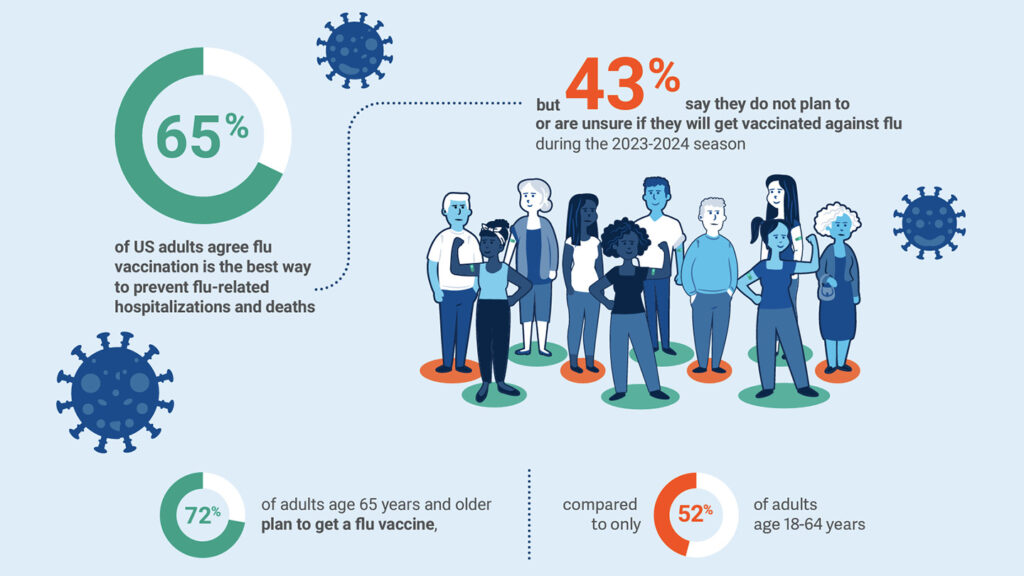
The results of the National Foundation for Infectious Diseases’ 2023 national survey of attitudes about influenza, COVID-19, respiratory syncytial virus and pneumococcal disease are raising concerns among infectious disease experts. There are implications for residents and workers in senior living.
The NFID hosted its annual news conference on the topic on Thursday, with experts presenting survey results as well as vaccine recommendations for the upcoming respiratory season and information on final influenza vaccine coverage data for the 2022-2023 US respiratory season,.
The Centers for Disease Control and Prevention urges everyone 6 months and older to get vaccinated against flu and COVID-19 this season. Any adult 60 and older or at higher risk for severe disease should discuss the new RSV vaccine and pneumococcal vaccine with a healthcare professional, according to the agency.
And according to this year’s survey, almost two-thirds of US adults (65%) agree that vaccination is the best preventive measure against flu-related hospitalizations and deaths. But 43% said they do not plan to or are unsure whether they will get vaccinated against the flu.
Among older adults, 72% said they plan to get a flu vaccine, compared with only 52% of adults aged 18 to 64.
Similarly, only 40% of adults said they plan to get vaccinated against COVID-19 with the updated vaccine, and among adults aged 60 or more years, only 40% said they plan to get vaccinated against RSV.
Attitudes around RSV were even more concerning, the experts said. Among older adults, only 40% said they plan to get an RSV vaccine.
The NFID survey found that only 40% of US adults at higher risk for pneumococcal disease, including older adults and those with certain chronic health conditions, had been advised by a healthcare professional to get a pneumococcal vaccine. Among those advised to get vaccinated, 79% did so, underscoring the importance of a strong vaccine recommendation from a healthcare professional, said William Schaffner, MD, former NFID medical director and past president.
“This year, we have an extraordinary opportunity,” Schaffner said. “Vaccines may not be perfect in preventing every infection, but they turn a wild infection into a milder one. They keep us out of the hospital.”
Concerns about side effects (32%), distrust of vaccines (31%) and the belief that vaccines do not work well (27%) were the top reasons survey respondents cited for not getting vaccinated. In addition, 27% said they were worried about getting sick from vaccines.
Only 38% of US adults indicated that they would get the flu and COVID-19 vaccines at the same time, if offered, even though experts say the vaccines can be co-administered.
The speakers said that the survey findings reinforce the importance of raising awareness and addressing misconceptions about flu, COVID-19, RSV and pneumococcal disease, as well as the need for healthcare professionals to provide strong vaccine recommendations for patients.
A ‘thrilling’ time
Despite concerns related to the survey results, the experts said Thursday that with the availability of vaccines to protect against the flu, COVID-19 and RSV, it’s a “thrilling” time for those who work to prevent diseases.
“This is a thrilling year for those of us who work in the vaccine business and look at prevention of diseases,” NFID President Patsy Stincheield, RN, MS, CPNP, said during the group’s annual news conference. “This is a year we have all been waiting for.”
Last year
According to CDC data released Thursday, last year’s flu season was moderately severe, with an estimated 31 million cases reported, 14 million medical visits, 360,000 hospitalizations and 21,000 flu-related deaths.
The CDC estimates that only 47% of US adults received a flu vaccine during last year’s respiratory season, down from 49% in 2021-2022. As in previous years, older adults were more likely than younger adults to receive a flu vaccine — 70% of adults aged 65 and older were vaccinated last year, compared with 50% of adults aged 50 to 64 and 35% of adults aged 18 to 49.
Although uptake of COVID-19 vaccines initially was high, staying up to date with vaccine recommendations has been more challenging. More than half (57%) of older adults did not get the bivalent vaccine, leaving them at increased risk for severe outcomes, including hospitalization and death, according to the NFID.


